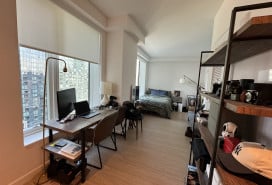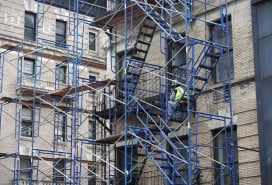How one tricky sale ended in negotiations over the buyer's takeout bills

Even in New York City's hot market, not every deal goes off without a hitch. In our new feature Sold! we look at sales that almost didn't happen—and how the sellers managed to make it work.
The problem: When it comes to last-minute messes that throw a wrench in your closing, it doesn't get much worse than having an entire building's gas shut off, as happened in the midst of a recent Upper West Side Sale, recounts Citi Habitats agent Loretta Bricchi Lee. "We always say with sales 'it's not closed until it's closed, but I think this particular apartment might have been jinxed," she says.
How'd this happen? A resident of the building smelled gas, and since the super wasn't around that day, took their concerns directly to Con Edison. "Apparently it's relatively common in pre-war buildings with old gas lines, that there are these minor leaks that are easily fixed," says Lee. "But after the explosions that have happened over the past few years, Con Ed is rightly extremely cautious, so in this case, they immediately shut off the whole building's gas to prevent any problems."
That's all an appropriate amount of caution, of course—you can't be too careful when it comes to gas safety in old buildings—but the problem is that thanks to a lengthy testing process and the possibility of replacing old pipes, it often takes ages to get the gas turned back on. (For instance, this particular building had its gas shut off in August, and as of press time, still hasn't had it turned back on, Lee says.)
The negotiation: All of which, as you can imagine, didn't go down too well with the buyer, in spite of their plans to do a gut renovation (and thus, not actually live in the gas-less apartment for at least another six months). "This started a very intense negotiation between the buyer and the seller," says Lee, with the buyer wanting to be reimbursed for the cost of restaurant meals, since she wouldn't have access to a working stove. "She wanted a certain amount per day to purchase her meals for six months, and that adds up to a large amount," says Lee.
On top of that, there was the very real possibility of an assessment as the building replaced its aging pipes. "It was not the most pleasant thing to deal with three days before closing," says Lee. And while it worked out in this case, gas issues can also cause mortgage lenders to balk, as it renders the state of the building's finances uncertain.
"There are usually fees to shut off and/or turn on a utility, and I would question who absorbs these costs, and if it's being done for safety reasons," says National Cooperative Bank's Janet Cupp. "If [it was safety-related], that would definitely be a reason to decline lending in a building." (But take comfort: Cupp also tells us NCB has never run into this particular problem in a New York building.)
In any case, after a rather heated back and forth, Lee and her seller managed to get around the problem: rather than putting money in Escrow, the seller agreed to pay one month's worth of maintenance fees to offset the cost of a possible future assessment, as well as extra cash for the buyer's food costs, though as Lee notes, "Not a full six months worth of restaurant meals."
"In the end, both the buyer and the seller took a certain amount of risk," she says. "The buyer took the risk that there might be a larger assessment than she was being reimbursed for," while the seller took the risk of spending unnecessary extra cash. And somehow, we're not surprised that a buyer's Seamless expenses ended up as a cornerstone of a NYC negotiation.
The takeaway: For the seller, it's that everything's on the table during a sale, even your buyer's takeout habit. And for buyers, check for a building's pipes to see if they've been replaced, because those of a certain (very old) vintage could possibly be up for replacement, costing you extra in assessments. As the adage goes: Buyer beware.
Related:
5 surprising snafus that can crater your closing
























